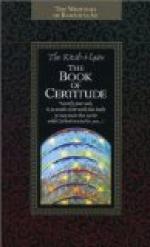in His early days, ere His ministry was proclaimed,
He saw two men engaged in fighting. One of them
asked the help of Moses against his opponent.
Whereupon, Moses intervened and slew him. To
this testifieth the record of the sacred Book.
Should the details be cited, they will lengthen and
interrupt the course of the argument. The report
of this incident spread throughout the city, and Moses
was full of fear, as is witnessed by the text of the
Book. And when the warning: “O Moses!
of a truth, the chiefs take counsel to slay Thee"(43)
reached His ears, He went forth from the city, and
sojourned in Midian in the service of Shoeb.
While returning, Moses entered the holy vale, situate
in the wilderness of Sinai, and there beheld the vision
of the King of glory from the “Tree that belongeth
neither to the East nor to the West."(44) There He
heard the soul-stirring Voice of the Spirit speaking
from out of the kindled Fire, bidding Him to shed upon
Pharaonic souls the light of divine guidance; so that,
liberating them from the shadows of the valley of
self and desire, He might enable them to attain the
meads of heavenly delight, and delivering them, through
the Salsabil of renunciation, from the bewilderment
of remoteness, cause them to enter the peaceful city
of the divine presence. When Moses came unto Pharaoh
and delivered unto him, as bidden by God, the divine
Message, Pharaoh spoke insultingly saying: “Art
thou not he that committed murder, and became an infidel?”
Thus recounted the Lord of majesty as having been said
by Pharaoh unto Moses: “What a deed is
that which Thou hast done! Thou art one of the
ungrateful. He said: ’I did it indeed,
and I was one of those who erred. And I fled
from you when I feared you, but My Lord hath given
Me wisdom, and hath made Me one of His Apostles.’"(45)
And now ponder in thy heart the commotion which God
stirreth up. Reflect upon the strange and manifold
trials with which He doth test His servants.
Consider how He hath suddenly chosen from among His
servants, and entrusted with the exalted mission of
divine guidance Him Who was known as guilty of homicide,
Who, Himself, had acknowledged His cruelty, and Who
for well-nigh thirty years had, in the eyes of the
world, been reared in the home of Pharaoh and been
nourished at his table. Was not God, the omnipotent
King, able to withhold the hand of Moses from murder,
so that manslaughter should not be attributed unto
Him, causing bewilderment and aversion among the people?
Likewise, reflect upon the state and condition of
Mary. So deep was the perplexity of that most
beauteous countenance, so grievous her case, that
she bitterly regretted she had ever been born.
To this beareth witness the text of the sacred verse
wherein it is mentioned that after Mary had given
birth to Jesus, she bemoaned her plight and cried out:
“O would that I had died ere this, and been
a thing forgotten, forgotten quite!"(46) I swear by
God! Such lamenting consumeth the heart and shaketh




